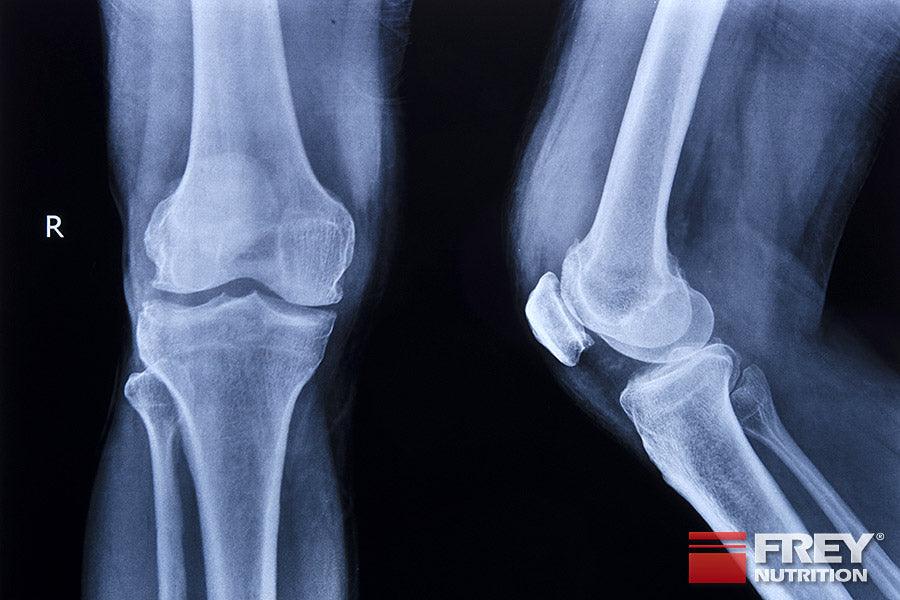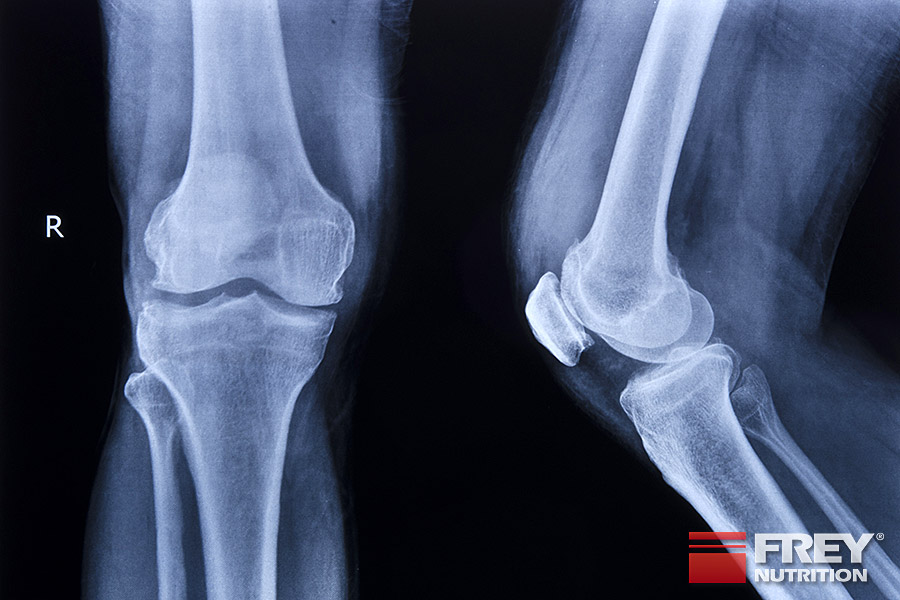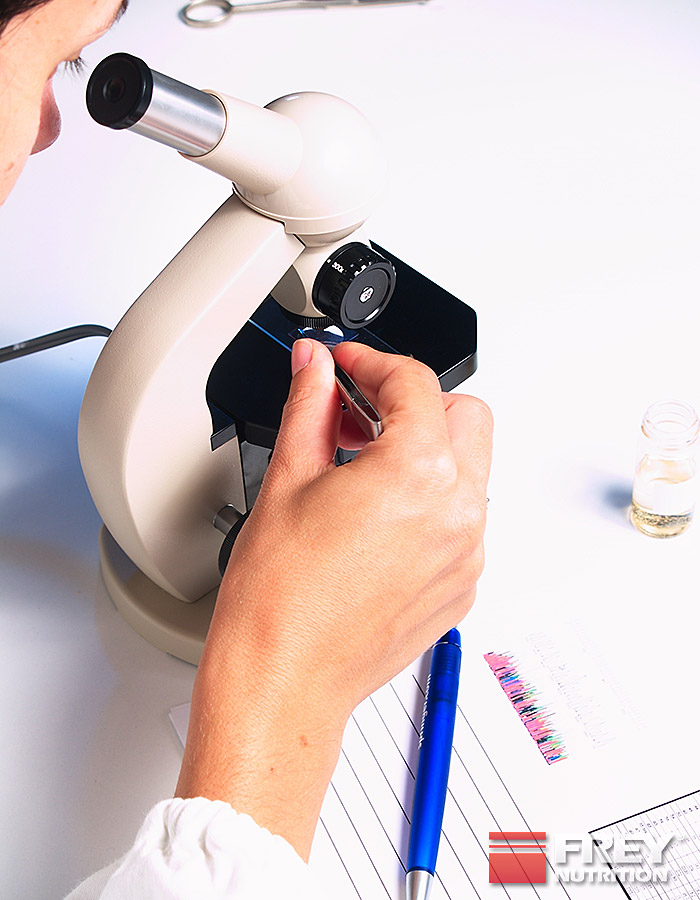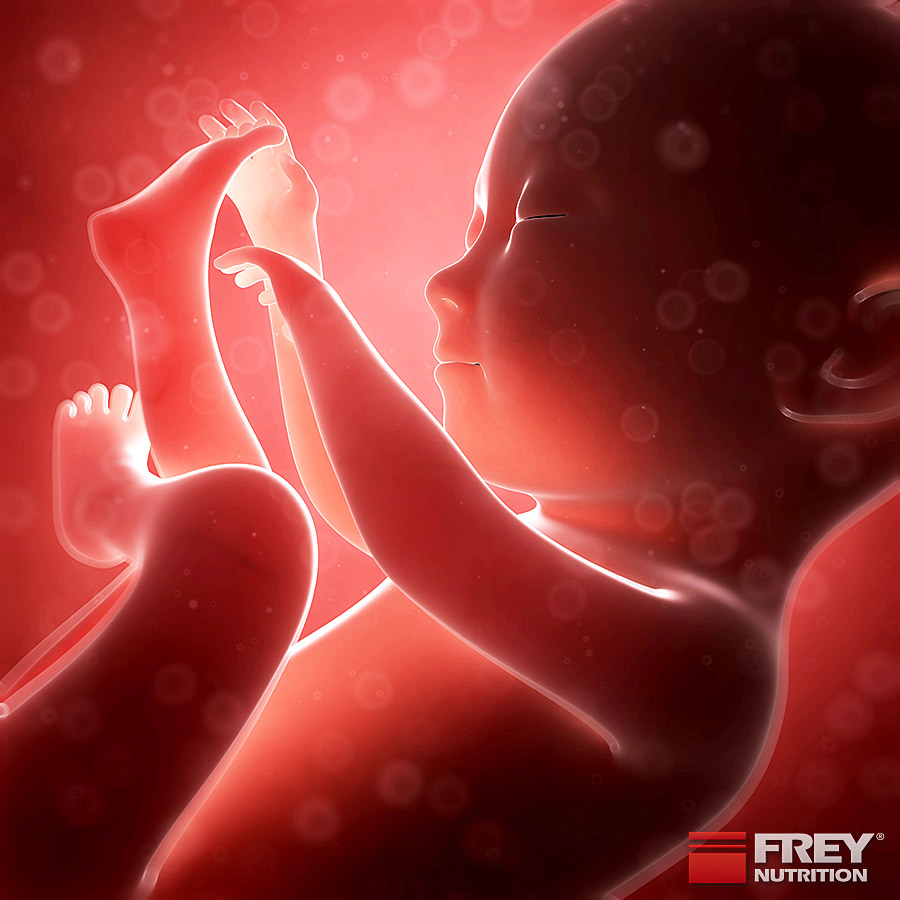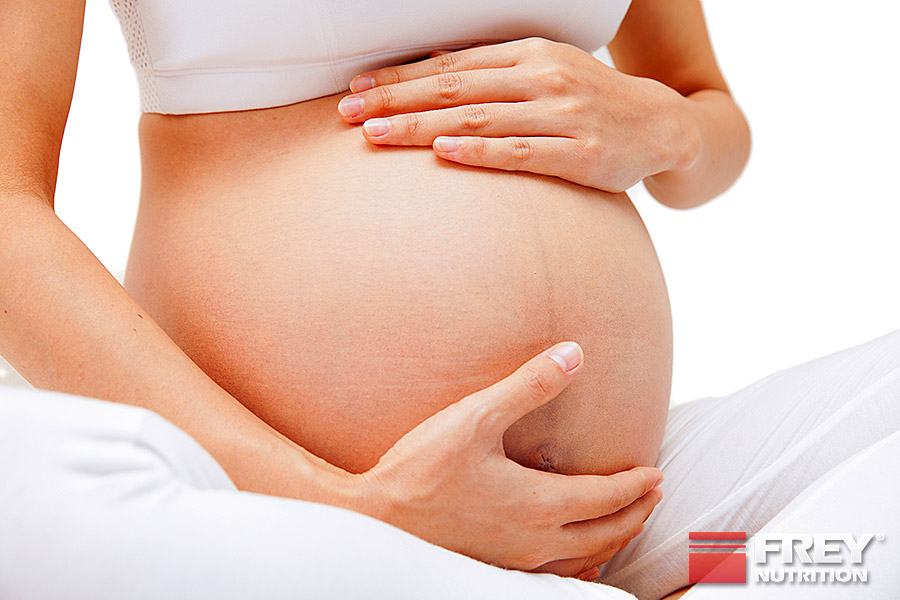IMPORTANT FOR BONE GROWTH AND MINERALIZATION
Recent findings with cell cultures of bone cells (osteoblasts) and embryonic bones from rats show that creatine also has a positive effect on bones and cartilage: bone cells and whole bones grow and mineralize significantly better. CREATINE could therefore have a positive effect on the healing of bone fractures and the ingrowth of bone prostheses (artificial hip joints) and also alleviate the course of osteoporosis in old age (I. Gerber, Bone Research Institute, Davos, dissertation (1998) and T. Wallimann, ETH Zurich) .
These findings seem quite understandable considering the fact that the mineralization and formation of cartilage and bone are highly energy-consuming processes, because the creatine kinase system is also present in these cells and can thus improve their cellular energetics. When the creatine kinase system in cartilage and bone cells of experimental animals was inhibited by feeding them with creatine analogues (e.g. guanidinopropionic acid), a clear malformation of the bones was observed, especially in the growth zone. (Funanage et al. 1992) , which underlines the physiological importance of creatine for the normal growth of cartilage and bones. The exact effect of creatine in these areas on humans still needs to be objectively proven in clinical trials. However, those people who take creatine for muscle and nerve strength will certainly be happy to accept an additional positive effect of creatine on their bones.
PROTECTIVE EFFECT FOR BRAIN AND NERVE CELLS
The enzyme, creatine kinase (CK), as well as its substrates, creatine (Cr) and phosphocreatine (PCr), are also found in brain and nerve cells in relatively high concentrations and are particularly concentrated in those cells that are responsible for the coordination of movements (Purkinje cells in the cerebellum) as well as for learning and memory (pyramial cells of the hippocampus). (Kaldis et al. 1996) . This suggests that creatine plays an important role in the energetics of these brain functions and that creatine supplementation CAN IMPROVE BRAIN PERFORMANCE .
A child who had no detectable phosphocreatine in his brain due to a genetic defect in the creatine synthesis pathway (guanidinoacetate aminotransferase) was admitted to hospital with severe neurological disorders. After the then unknown defect was identified, which took a long time, the symptoms were significantly improved by regular creatine supplementation (Stöckler et al. 1996) , which proves the indispensable importance of this substance for brain functions directly in humans.
Recent findings show a positive effect of creatine on the brain and brain performance and suggest that certain neuro-degenerative changes, such as Alzheimer's and Huntington's disease and also multiple sclerosis or Parkinson's disease, can be alleviated with creatine (Matthews et al. 1998) . In a study published in March 1999 in "Nature Medicine" and which caused a great stir in the American press, it was shown that creatine in a transgenic animal model (SOD mutant) has a markedly positive neuroprotective effect on amyotrophic lateral sclerosis (ALS) (Klivenyi et al. 1999) . A similarly striking neuroprotective effect of creatine was demonstrated by the same research group in Boston in an animal model for Parkinson's disease (Matthews et al. 1999) .
These results now definitely confirm that creatine is a SIGNIFICANT PROTECTIVE FUNCTION FOR BRAIN AND NERVE CELLS especially from damages caused either by lack of oxygen (Holtzman et al. 1997; Holtzman et al. 1998a,b) , or from oxygen radicals in the brain (Klinenyi et al. 1999) . Possible mechanisms include the general improvement of the energy status of the cells treated with creatine (Guerrero and Wallimann 1998) and/or the protective effect of creatine directly on the mitochondria. It has recently been shown that creatine can have a significant protective effect against programmed cell death (apoptosis) in various cells (O'Gorman et al. 1997b; Brdiczka et al. 1998) , which is triggered by mitochondrial events, among others. The octameric structure of mitochondrial creatine kinase plays a very important role (Brdiczka et al. 1998; Schlattner et al. 1999) .
In fact, it has been shown in neuronal cell cultures that creatine prevents the death of neurons that have either been overstimulated by glutamate (over-excitotoxicity) or have been infected with the Alzheimer's beta-amyloid protein (Brewer and Wallimann 2000) .
Thus, nothing should stand in the way of creatine supplementation for controlled studies on patients with various neurodegenerative diseases, including Alzheimer's disease (Buerklen et al. 2006) .
In animal models of brain ischemia and stroke, a significant neuroprotective effect of creatine was demonstrated, and the secondary damage around the effective cerebral infarction (penumbra) was significantly reduced (Adcock et al. 2002; Prass et al. 2006) .
In fact, creatine administration has also been shown to be effective in preventing complexifications associated with traumatic brain injury (Sakellaris et al. 2006) . In a pilot study with 39 children and adolescents with traumatic brain injuries aged 11 - 18 years, 0.4 grams of creatine/kg/day was administered for 6 months and it was found that the creatine group showed significantly better rehabilitation of cognitive abilities, personality and behavioral factors, as well as mobility and independence compared to the control group.
POSITIVE FOR FERTILITY AND GYNAECOLOGY
The expression of the two creatine kinase isoforms present in the uterus and placenta, BB-CK and mitochondrial CK, is tightly regulated during pregnancy (Thomure et al. 1996) and is massively increased in this organ, especially shortly before birth. (Payne et al. 1993; Wallimann and Hemmer 1994) . In fact, BB-CK is the most prominent protein induced by estrogen in the uterus (Reiss and Kaye 1981) .
This in turn indicates an important function of the creatine kinase system for muscle energetics during the birth process. It is quite conceivable that creatine supplementation in the last trimester of pregnancy could have a positive effect on the preservation and growth of the fetus, as well as the actual birth process. However, this has not yet been sufficiently investigated in humans. In addition, a possible advantage of such creatine supplementation could be seen in the significant protective effect for the brain of the newborn, since creatine largely protects the brain of newborn rats from oxygen debt, which can certainly occur during the birth process. (Holtzman et al. 1998a,b) . Clinical studies on humans are currently underway. The fact that creatine and phosphocreatine are present in relatively high concentrations in colostrum and breast milk shows the importance and safety of these endogenous compounds for the structure and function of the organs of the embryo and newborn.
Regarding male fertility, it should be noted that creatine kinase is present in relatively high concentrations in the sperm of various animal species and the isoforms of the enzyme are localized at specific sites in the sperm where chemical energy is converted (Wallimann et al. 1986; Kaldis et al. 1996) . Phospho-creatine serves as an important energy source for sperm movement in various animal species (Kaldis et al. 1997; van Dorsten et al. 1997) .
Furthermore, it has been proven in humans that there is a connection between male infertility and a well-functioning creatine kinase system (Huszar et al. 1992) . In addition, sperm motility and speed could be increased during in vitro fertilization by adding extra phosphocreatine as an energy source (Fakih et al. 1986) . In men, high concentrations of creatine and phosphocreatine, which are secreted by the seminal vesicle, appear in the semen (Wallimann and Hemmer 1994; Lee et al. 1998) . The creatine kinase system, and thus also creatine and phosphocreatine, are important for the transport of energy from the middle part of the sperm, where the mitochondria are located as energy centers, along the long sperm tail. However, it has not yet been sufficiently clarified whether oral creatine supplementation in humans can directly influence sperm production and function, and possibly also fertility in general.
INHIBITING THE GROWTH OF CANCER CELLS IN ANIMAL MODEL
It has been shown with cancer cells in culture and in vivo animal models that CREATINE and creatine analogues CAN SIGNIFICANTLY INHIBIT THE GROWTH OF CERTAIN CANCER CELLS (Miller et al. 1993; Bergnes et al. 1996; Kristensen et al. 1999) . Cyclo-creatine, a synthetic compound, inhibits the growth of these cancer cells even at very low concentrations and increases the sensitivity of cancer cells to conventional chemotherapeutic agents, sometimes up to a thousand times (Teicher et al. 1995). The exact mechanism of this anti-cancer effect of creatine and analogues is still largely unclear and possible applications of these substances in humans are still in the early stages.
IMPORTANT FOR SKIN AND WOUND HEALING
Various scientific studies have shown that a surprising amount of creatine kinase, both cytosolic BB-CK and the mitochondrial Mi-CK isoenzyme, is present in the suprabasal layers of the skin, including in various cell types of the hair follicles. Immediately after a skin injury, creatine kinase activity in the wound increases significantly, indicating that creatine kinase and creatine are also important for wound healing. (Schlattner et al. 2002) .


